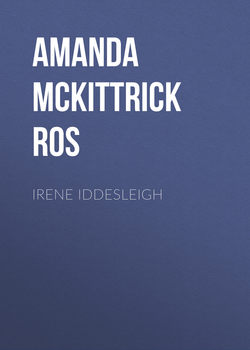Читать книгу Irene Iddesleigh - Amanda McKittrick Ros - Страница 7
CHAPTER VII
ОглавлениеDISTANT shores have great attractions and large expectations. They harbour around their beaches the exile and patriot, the king and peasant, the lawyer and artisan, the rising swindler and ruined prince. Spotted throughout the unclaimed area of bared soil may be seen the roughly-constructed huts and lofty homes of honest industry. Yes, and concealed therein are hearts yearning for the land of nativity and national freedom; hearts which sorrow after bygone days, and sink low when brooding over the future tide of fortune which already has stopped its gentle flow.
The reception on the evening of Irene’s marriage was glorious and brilliant, as were all those given by Lord and Lady Dilworth, and, although attended by society’s cream alone, there appeared a visible and unhidden vacancy in the absence of her who so often lent a glow of gaiety to the high-toned throng.
There seemed to be no rival now of buried lineage to mar their desire, or incur the jealousy of would-be opponents; no one to share sympathetically with the afflicted sister of equality and worth; nor was there any one present of such knightly and commanding dignity as he, who, not many hours previous, had taken upon him the sad duty of delivering up the keys of devotion to her who kept the door of ardent adoration locked against his approach.
It would probably be a long time ere such a scene of silly jealousy and ire would take place as that witnessed, in which the greater majority of those present were then partakers! And, further, it would surely be a much longer period before these guests would again share alike in the generosity so often extended them by Lord and Lady Dilworth.
Next day after Irene’s marriage was a busy one at Dilworth Castle; hasty and numerous were the preparations for desolation and departure. Weeks preceding the joyful event, or what should have been, were leisurely devoted to the artistic arrangements in every room within the lordly manor. But, alas! so sudden now was joy’s termination, that hours alone were the boundary of command.
It may be stated that Lord Dilworth owned three very extensive estates, namely—Dilworth, Ayrtown, and Howden. The first-mentioned extended around the castle of that name, encompassing a spacious tract of soil indeed, and might have done justice to moderation in its most expensive form. The Ayrtown Estate, which entirely covers the southern portion of Cheshire, owns a magnificent Hall, the residence of the Earl of Tukesham, and, although not considered so lucrative as Dilworth, may be estimated a handsome dowry for the son of any rising nobleman in the realm. The Howden Estate, on which are elegantly formed two buildings of note—namely, Blandford Castle and Lauderdale Lodge, both exquisite constructions of architecture and skilled workmanship, and occupied respectively by Sir Sydney Hector and Admiral Charles Depew—lies chiefly around the south-west of Yorkshire, and is not quite so desirable or adapted for agriculture as the two first mentioned, being mostly rented for grazing purposes by the numerous and varied owners of its rugged plots. These estates became so heavily mortgaged that prompt sale was indispensable, and, the matter being quietly arranged six months beforehand, the sixth day of August was the day set apart for the disposal of same.
Bidders were numerous and offers low. Eventually the purchasers were as follow:—The Marquis of Orland bought Dilworth Estate; Lord Henry Headen purchased Ayrtown Estate, whilst the lot of Howden fell upon Sir Rowland Joyce, the famous historian and national bard.
Thus were wrested from Lord and Lady Dilworth their luxurious living. They were driven from their nursery of rich and complicated comforts, their castle of indolence and ease. They were now thrown upon the shivering waters of want, without a word of sympathy in the dreadful hour of their great affliction, without home or friend to extend shelter or sustenance, and cast afloat upon the ocean of oscillating chance to speed across it as best they could.
Was Lord Dilworth therefore to be pitied? Were the torrents of gold which were bound to trickle from these enormous lands and dwellings, manufactories and villages, too trifling for his use? Not a morsel of pity was offered either him or Lady Dilworth as their circumstances became known in the homes of their associates, who so often fed on the fat of their folly and graced their well-lined tables always covered with dainties of deserving censure.
Could human mind contemplate that she who reigned supreme amongst society, she who gave the ball in honor of Irene Iddesleigh’s marriage, should ere four days be a penniless pauper? Yet such was fact, not fiction.
The seventh day of August saw Lord and Lady Dilworth titled beggars, steering their course along the blue and slippery waves of the Atlantic, to be participators in the loathing poverty which always exists in homes sought after destruction, degradation, and reckless extravagance.
